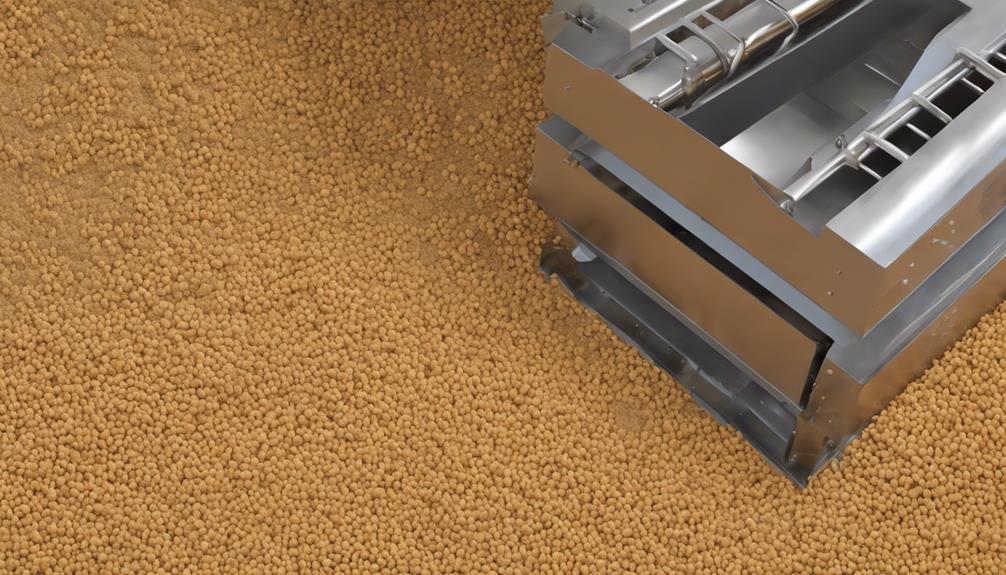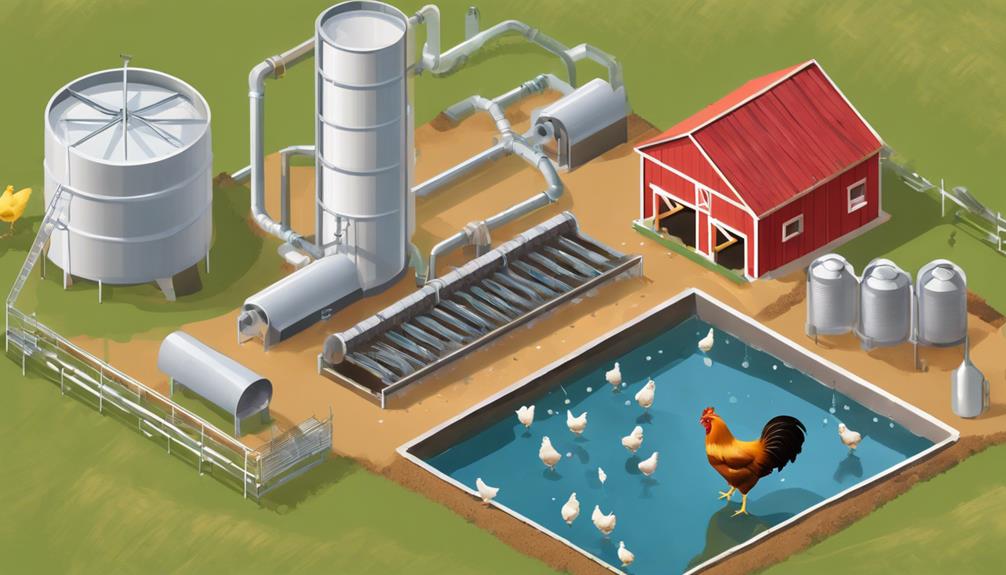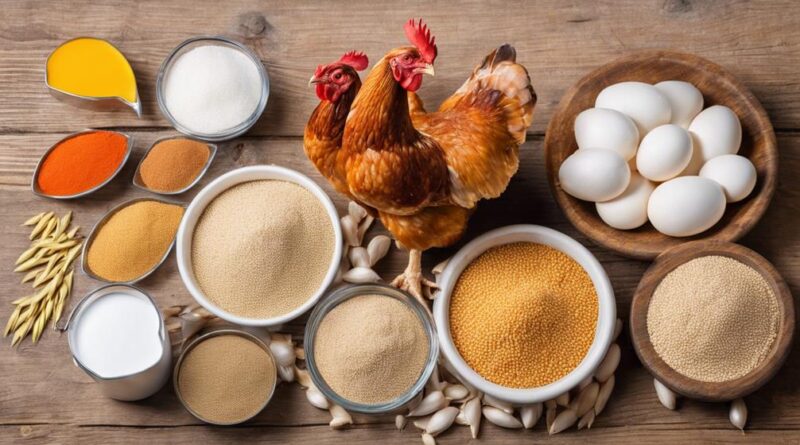10 Best Strategies for Broiler Chicken Feed Optimization
To optimize your broiler chicken feed, ensure proper protein balance for growth. Focus on energy sources like fats and fibers to boost performance. Enhance health with vitamin and mineral supplements, distributing them evenly. Use data-driven feed formulation techniques to maximize efficiency. Aim for a low feed conversion ratio by choosing quality diets. Consider probiotics over antibiotics for gut health. Pelletize feed for enhanced digestibility and nutrient absorption. Store feed correctly for freshness. Monitor water quality for optimal health. Evaluate feed additives for improved outcomes. Discover more strategies to enhance your broiler chicken feed for optimal performance.
Protein Requirements
When optimizing broiler chicken feed, it's crucial to carefully consider their protein requirements to ensure proper growth and development. Protein serves as a fundamental building block for broiler chickens, playing a crucial role in various physiological functions such as growth performance and immune function. To meet the protein needs of broiler chickens effectively, it's essential to focus on factors like amino acid balance and digestibility rates within the feed formulation.
Amino acids are the basic components of proteins, and their balance in the feed is vital for broiler growth and development. Broiler chickens require a precise blend of essential amino acids for optimal performance. Imbalances can lead to reduced growth rates, inefficient feed utilization, and compromised immune function. Therefore, formulating feed with the correct amino acid profile is key to supporting the health and productivity of broiler chickens.
Moreover, the digestibility rates of protein sources directly impact nutrient absorption and utilization by broiler chickens. High-quality protein with good digestibility ensures that the birds can efficiently convert feed into muscle mass. This is crucial for achieving the desired growth rates and ensuring the overall well-being of the broilers. By considering both amino acid balance and digestibility rates in the feed formulation, you can optimize broiler chicken diets to support their growth, immune system, and overall performance effectively.
Energy Sources
To optimize broiler chicken feed effectively, selecting appropriate energy sources is crucial for supporting their growth and performance. When considering energy sources for broiler chickens, it's essential to focus on fat and fiber sources to meet their high energy requirements. Fat sources such as vegetable oils, animal fats, and fish oils are rich in energy and help in maintaining the energy balance of the birds. Including fat sources in the feed mix can enhance the energy density of the diet, supporting optimal growth rates in broiler chickens.
On the other hand, fiber sources like corn and soybean hulls provide a more sustained release of energy, promoting gut health and overall digestion. Corn, a commonly used energy source in broiler feed, is highly digestible and serves as an excellent source of carbohydrates for energy production. Soybean, another prevalent ingredient, offers a balance of protein and energy, contributing to the overall nutritional profile of the feed.
Balancing the inclusion of these energy sources is crucial to ensure that the feed meets the energy requirements of broiler chickens at different growth stages. By carefully selecting and formulating the energy sources in the feed, you can support the efficient growth and performance of broiler chickens, ultimately optimizing their feed conversion rates and overall health.
Vitamin and Mineral Supplements
For optimal broiler chicken feed optimization, incorporating essential vitamin and mineral supplements is imperative to ensure the birds' overall health and performance. These supplements play a crucial role in supporting various physiological functions, enhancing immunity, and promoting growth. When formulating broiler feed, it's essential to consider the feed texture to ensure proper mixing and distribution of these vital nutrients throughout the feed.
Vitamins and minerals are essential micronutrients that are necessary for the proper functioning of metabolic processes in broiler chickens. They're involved in various functions such as bone development, enzyme activation, and immune system support. Adequate levels of these micronutrients are critical for optimal nutrient absorption, which directly impacts the birds' growth rate and feed efficiency.
The feed texture plays a significant role in how well broiler chickens can access and utilize these essential vitamins and minerals. A consistent and appropriate feed texture ensures that the birds can consume the feed easily and that the nutrients are evenly distributed throughout the mixture. This, in turn, promotes better nutrient absorption and utilization by the birds, leading to improved performance and overall health.
Feed Formulation Techniques
Utilize advanced algorithms to optimize broiler chicken feed through precise feed formulation techniques. Ingredient selection plays a crucial role in formulating balanced feed for broiler chickens. By carefully choosing ingredients based on their nutrient composition, you can ensure that the feed meets the specific requirements of the birds at different growth stages. Balancing the nutrients in the feed is essential to support the overall health and performance of the broilers.
Cost-effective formulations are key in maximizing profitability. By utilizing feed formulation techniques that optimize performance while keeping costs in check, you can achieve a balance between quality and affordability. This involves strategically selecting ingredients that provide the necessary nutrients at the best price points, without compromising on the feed quality.
Performance optimization is a primary goal when formulating broiler chicken feed. Through advanced algorithms and precise calculations, you can tailor the feed to meet the birds' nutritional needs, resulting in improved growth rates, feed efficiency, and overall health. By fine-tuning the feed formulation techniques based on data-driven insights, you can enhance the performance of your broiler flock while maintaining cost-effectiveness. Remember, a well-formulated feed is the foundation for achieving optimal results in broiler chicken production.
Feed Conversion Ratio
In broiler chicken production, optimizing the feed conversion ratio is crucial for maximizing efficiency and profitability. Feed efficiency plays a pivotal role in determining the success of poultry farming operations. Genetic selection is a key factor in improving feed conversion ratios. Selecting breeds with a genetic predisposition for efficient feed utilization can significantly enhance overall performance. Through strategic breeding practices, poultry producers can achieve better growth performance while minimizing feed wastage.
Growth performance is directly linked to feed conversion ratio. By manipulating the diet composition based on the specific nutritional requirements of broiler chickens at different stages of growth, farmers can improve feed efficiency. This involves formulating diets that are well-balanced and tailored to meet the birds' nutritional needs without excess or deficiency. Diet manipulation strategies such as adjusting protein levels, energy content, and adding supplements can positively impact feed conversion ratios.
Efforts to optimize the feed conversion ratio are essential for sustainable poultry production. Efficient feed utilization not only reduces production costs but also promotes environmental sustainability by minimizing waste output. Monitoring and analyzing data related to feed consumption, weight gain, and overall performance are crucial for identifying areas where improvements can be made. By focusing on feed efficiency through genetic selection and diet manipulation, poultry farmers can enhance productivity and profitability in their operations.
Antibiotic Alternatives
Consider exploring innovative strategies as substitutes for antibiotics in broiler chicken production to address concerns related to antimicrobial resistance. One effective alternative to antibiotics is the use of probiotics in broiler feed. Probiotics are beneficial bacteria that can help maintain a healthy gut microbiota in chickens, improving digestion and nutrient absorption. By promoting a balanced gut flora, probiotics can enhance the overall health and immunity of broiler chickens, reducing the need for antibiotics.
In addition to probiotics, herbal remedies have shown promise as natural alternatives to antibiotics in broiler chicken production. Certain herbs possess antimicrobial properties that can help combat pathogens in the chicken's digestive system. For example, herbs like oregano, thyme, and garlic have been found to have antibacterial effects, which can support the health of broiler chickens without the use of antibiotics.
Research has indicated that probiotic benefits and herbal remedies can contribute to improved growth performance, feed efficiency, and overall health in broiler chickens. By incorporating these antibiotic alternatives into broiler feed formulations, producers can promote sustainable and responsible practices while ensuring the welfare of the animals. Experimenting with different combinations of probiotics and herbal supplements tailored to the specific needs of broiler chickens can lead to optimized production outcomes while reducing reliance on antibiotics.
Feed Pelletization Methods

Explore various feed pelletization methods to enhance the nutritional value and digestibility of broiler chicken feed, optimizing feed efficiency and overall performance.
The size of feed pellets plays a crucial role in broiler chicken nutrition. Smaller pellet sizes generally result in better digestibility, as they allow for easier consumption and breakdown in the bird's digestive system. On the other hand, larger pellets can sometimes lead to feed wastage and lower digestibility rates. Therefore, selecting the appropriate feed pellet size is essential for maximizing nutrient absorption and growth in broiler chickens.
When considering pelletization methods, it's important to evaluate pellet binder alternatives. Binders are crucial in pellet formation as they help maintain the structural integrity of the pellets. Common binder options include natural substances like starches, gelatin, and clays, as well as synthetic binders. While synthetic binders may offer better pellet durability, natural binders are often preferred for their cost-effective nature and minimal impact on feed digestibility.
Opting for cost-effective pellet binder alternatives can contribute to overall feed optimization without compromising on nutritional value or digestibility. By carefully selecting the right pelletization method and binder type, you can ensure that broiler chickens receive feed that isn't only nutritionally balanced but also efficiently utilized by the birds, ultimately leading to improved performance and growth rates.
Feed Storage Best Practices
Utilize proper storage techniques to preserve the quality and freshness of broiler chicken feed, ensuring optimal nutrient retention and minimizing the risk of contamination. Proper ventilation is crucial in maintaining feed quality. Storing feed in well-ventilated areas helps prevent moisture buildup, which can lead to mold growth and nutrient degradation. Ensure that storage containers or silos have adequate ventilation to allow for air circulation, reducing the chances of feed spoilage.
Rodent control is another essential aspect of feed storage best practices. Rodents not only consume feed intended for broiler chickens but also contaminate the remaining feed with their droppings and urine, posing health risks to the birds. Implementing rodent-proof storage solutions such as elevated feeders or using rodent-proof containers can help mitigate this risk. Regularly inspect storage areas for any signs of rodent activity and take necessary measures to eliminate these pests promptly.
Furthermore, it's important to store feed away from direct sunlight and in a cool, dry place to maintain its nutritional value. Exposure to sunlight can accelerate the breakdown of certain nutrients in the feed. Additionally, fluctuations in temperature and humidity can contribute to the deterioration of feed quality. By following these feed storage best practices, you can ensure that your broiler chickens receive feed that's fresh, uncontaminated, and nutritionally rich.
Water Quality Importance

Proper water quality is essential for maximizing broiler chicken health and performance. Ensuring that the water provided to your broiler chickens meets quality standards is crucial for their overall well-being and growth. Here are some key points to consider regarding water quality:
- Water Testing: Regularly conduct water testing to assess parameters such as pH levels, mineral content, and microbial presence. High levels of contaminants can adversely affect the chickens' health and growth performance.
- Hydration Management: Adequate hydration is vital for broiler chickens to maintain their physiological functions and regulate body temperature. Monitoring water consumption patterns can help ensure that chickens are sufficiently hydrated.
- Quality Standards: Adhere to established water quality standards recommended for broiler production. Meeting these standards can help prevent issues related to water-borne diseases and poor performance.
- Treatment Options: Implement appropriate water treatment methods, such as filtration or chlorination, to improve water quality. Consult with experts to determine the most suitable treatment options based on your specific water source and quality.
Feed Additives Evaluation
Maintaining optimal broiler chicken performance requires a thorough evaluation of feed additives to enhance growth and health outcomes. When assessing feed additives for broiler chickens, two critical factors to consider are nutrient absorption and gut health.
Nutrient absorption plays a pivotal role in ensuring that broiler chickens receive the necessary vitamins, minerals, and other essential nutrients for growth and development. Feed additives such as enzymes, probiotics, and organic acids can improve nutrient absorption efficiency in the birds, leading to better overall performance. Enzymes help break down complex nutrients into simpler forms that are easier for the chickens to digest, while probiotics promote a healthy gut microbiota that aids in nutrient uptake.
Gut health is another crucial aspect to evaluate when considering feed additives for broiler chickens. A well-balanced gut microbiome is essential for proper digestion, nutrient absorption, and immune function in chickens. Additives like prebiotics, probiotics, and symbiotics can help maintain gut health by promoting the growth of beneficial bacteria and suppressing harmful pathogens in the gut environment.
Frequently Asked Questions
How Does Feed Optimization Impact Broiler Chicken Welfare?
Feed optimization significantly impacts broiler chicken welfare. Properly balanced feeds can positively impact behavior, reducing stress and aggression.
Additionally, optimized feed contributes to overall health benefits, ensuring proper growth, immune function, and disease resistance in broiler chickens.
What Are the Environmental Implications of Feed Optimization?
When considering feed optimization for broiler chickens, it's crucial to analyze the environmental impact and resource utilization. Efficient feed strategies can reduce waste production, lower greenhouse gas emissions, and minimize water usage.
Can Broiler Chicken Feed Optimization Affect Meat Quality?
Optimizing broiler chicken feed can significantly impact meat quality. By carefully selecting feed ingredients, you can enhance meat texture and flavor profile.
The nutrients in the feed directly influence the composition of the meat, affecting its taste and tenderness. Ensuring a balanced diet for broiler chickens can lead to improved meat quality, making it more desirable for consumers.
Proper feed optimization is key to achieving consistent and high-quality meat products.
Are There Any Ethical Considerations in Feed Optimization Practices?
When considering ethical considerations in feed optimization practices, it's crucial to prioritize animal welfare. Ensuring that broiler chickens receive a balanced diet that meets their nutritional needs without compromising their health or well-being is paramount.
Ethical feed optimization practices should aim to enhance animal health, minimize environmental impact, and uphold industry standards for humane treatment. Prioritizing these aspects can lead to improved overall welfare for the broiler chickens involved.
How Does Feed Optimization Contribute to Sustainable Poultry Production?
Feed optimization directly impacts sustainability in poultry production. By maximizing resource efficiency through tailored diets, you can enhance broiler growth rates and reduce feed wastage.
This efficiency not only benefits the environment by reducing excess resource consumption but also leads to economic gains for producers. Optimized feed formulations play a crucial role in sustainable poultry farming by promoting efficient resource utilization and improving overall profitability.
Conclusion
In conclusion, optimizing broiler chicken feed is crucial for maximizing growth and efficiency in poultry production.
By carefully considering protein requirements, energy sources, and vitamin and mineral supplements, along with implementing feed formulation techniques and evaluating feed additives, you can improve feed conversion ratios and overall performance.
Remember to prioritize feed storage practices, water quality, and pelletization methods to ensure the best results for your broiler chickens.
